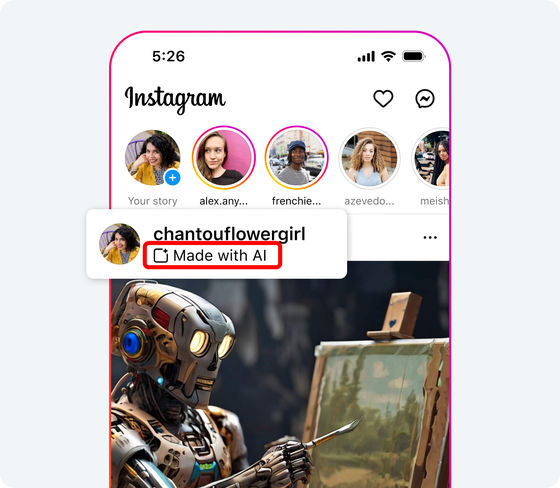Meta announces that it will label videos, music, and images created with AI with the 'Made with AI' label starting in May 2024

Meta, which develops and operates social media platforms such as Facebook and Instagram, has announced that it will label content generated by AI with the ' Made with AI ' label.
Our Approach to Labeling AI-Generated Content and Manipulated Media | Meta

To provide greater transparency and context, we'll start labeling a wider range of video, audio and image content on our apps as “Made with AI.” https://t.co/LWQAhR9vG8
— Meta Newsroom (@MetaNewsroom) April 5, 2024
Meta relaxes “incoherent” policy requiring removal of AI videos | Ars Technica
https://arstechnica.com/tech-policy/2024/04/meta-relaxes-incoherent-policy-requiring-removal-of-ai-videos/
Facebook and Instagram to label digitally altered content 'made with AI' | Technology | The Guardian
https://www.theguardian.com/technology/2024/apr/05/facebook-instagram-ai-label-digitally-altered-media
Meta's new AI deepfake playbook: More labels, fewer takedowns | TechCrunch
https://techcrunch.com/2024/04/05/meta-deepfake-labels/
Meta has an independent adjudication body called the Oversight Board to ensure it doesn't make the wrong decisions when deciding to remove or retain content on platforms like Facebook and Instagram. Based on feedback from the Oversight Board that ' we need to update our approach to reflect a broader range of existing content and provide context about content through labels ,' Meta has announced that it will make changes to how it handles AI-generated content on Facebook, Instagram, and Threads.
The incident first started with a controversy over the censorship of a video collage that appeared to show US President Joe Biden reaching his hand out to his granddaughter's chest.
Meta's auditing agency judges Joe Biden's collage video of his granddaughter reaching for her chest to be 'safe because it's not made by AI and doesn't violate policies,' but criticizes the current incoherent policies for improvement - GIGAZINE

Until now, Meta has only targeted videos that are 'generated and edited by AI to make it appear as if humans are saying things they are not actually saying,' but it agrees with the Oversight Committee's argument that the existing approach is too narrow, and explains that it will update Meta's manipulative media policy. Meta's manipulative media policy remains as it was in 2020 , and the Oversight Committee has criticized the existing policy as 'narrow,' 'incoherent,' and 'confusing to users.'
In addition, the Oversight Committee argues that 'removing manipulated media that does not violate our community standards risks unnecessarily restricting freedom of expression.' In response, Meta has announced that it will encourage a 'less restrictive' approach to manipulated media, such as contextual labels. It also announced that starting in July 2024, it will 'stop removing videos based solely on our manipulated media policy.'
Meta announced in February 2024 that it plans to label videos, audio, and images generated by AI with the label 'Made with AI.' This labeling will be based on technical standards for identifying AI content that are being developed in collaboration with Google and others, as well as information from people who self-disclose that they are uploading AI-generated content. Meta announced that it will begin labeling videos, audio, and images with the label 'Made with AI' in May 2024.

However, Meta said, 'If we determine that a digitally created or edited image, video, or audio poses a particularly high risk of materially deceiving the public about something important, we may add more prominent labels to give people more information and context.' It explains that it plans to more clearly label AI-generated content that may unintentionally deceive people.
Meta also announced that in July 2024 it will stop censoring AI-generated content that does not violate its policies restricting voter interference, bullying or harassment, violence, or incitement.
Meta will begin evaluating its AI content policy in spring 2023 and will update the policy after consultation with more than 120 stakeholders in 34 countries around the world. The survey results showed strong support for labeling AI-generated content. In addition, a public opinion survey of more than 23,000 users in 13 countries was conducted, and 82% of respondents supported the introduction of warning labels for AI-generated content that portrays people as saying things they did not.
The Guardian has spoken to Meta, who confirmed that the 'Made with AI' labeling will apply to posts on platforms like Facebook, Instagram and Threads, but that different policies will apply to services like WhatsApp and Quest.
Related Posts:
in Web Service, Posted by logu_ii






